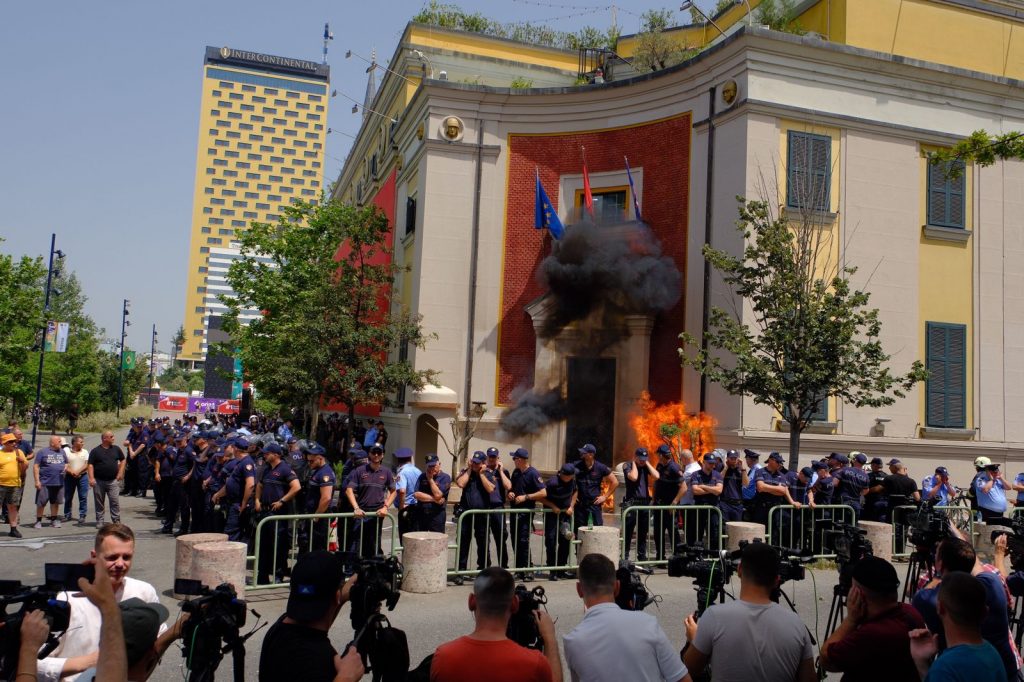October 7 protest in Albania: Democratic Party reps hint at potential violence

The Democratic Party (DP) has positioned the October 7 protest as a potential turning point in Albania, with leaders suggesting it could last beyond a single day and even escalate into civil unrest. According to DP leaders, including the head of the Parliamentary Group, Gazment Bardhi, the protest may include significant disruptive actions aimed at pressuring the government to concede to their demand for a technical government in the run-up to the elections.
Why is this important: The rhetoric from DP leadership has raised concerns about potential violence. The DP has openly discussed the use of civil disobedience and unrest. According to Bardhi, the Democrats “won’t exclude any methods, including blocking roads, ports, and airports.”
Context: In recent years, the Democrats have often resorted to violence or the threat of violence in their protests, usually involving orchestrated acts from a small, radical minority of supporters. In past demonstrations, participants have burned tires, thrown Molotov cocktails, and clashed with police, prompting authorities to use tear gas.
Despite these tactics—or perhaps because of them—the DP has consistently failed to rally substantial public support for its actions. Many perceive these actions as driven by a narrow party agenda, which they see as a poor substitute for the Democrats’ inability to mobilize widespread support to defeat the Socialists.
Given the frequency of these protests, and their blackmailing undertones, the government’s willingness to engage with the Democrats on their maximalist demands—such as a technical government—has diminished over time. In 2017, following an agreement between Socialist leader Edi Rama and then-leader of the Democrats, Lulzim Basha, a technical government was established, with the Democrats controlling key ministries and institutions. Despite this, the DP still lost the elections heavily. On Thursday, the Secretary General of the Socialists rejected demands for a technical government and warned of a firm response to any violence and unrest.
After 11 years in power, there is certainly dissatisfaction with Prime Minister Edi Rama from various quarters. However, the Democrats have failed to capitalize on this dissatisfaction in a well-coordinated, strategic way. Instead, the party seems more concerned with the fate of its former leader. The timing of the protests suggests that, once again, the motivation lies with the legal problems of Sali Berisha, who is awaiting trial on corruption charges. He has also been sanctioned by the U.S. and the UK for corruption and links to organized crime. Many believe that strengthening Berisha’s position ahead of his trial is the true reason behind the threat of violence.
Potential scenarios: DP leaders seem to be betting on an extended protest, possibly lasting multiple days, to generate sustained pressure on the government. On Friday, the head of the DP Parliamentary Group remarked, “This protest won’t be a one-day event; it may last for days, with every scenario on the table.” The absence of planned speeches has fueled speculation that demonstrators are preparing for direct action rather than peaceful assembly. DP leaders have repeatedly stated that they will not lead, but will follow the people in their anger during the protest.
However, despite the rising rhetoric from DP leaders in recent days, it remains uncertain whether the protest will achieve any concrete political objectives or improve the DP’s standing ahead of parliamentary elections in spring 2025. Historically, violent protests in Albania have rarely led to improved electoral chances or better negotiating positions. As for Berisha, his problem lies with Albania’s reformed justice institutions and its international partners. Even if they wanted to, it is doubtful the Socialists could intervene to help him.


